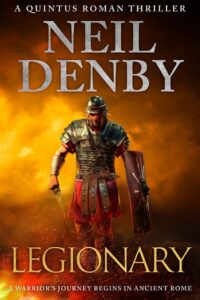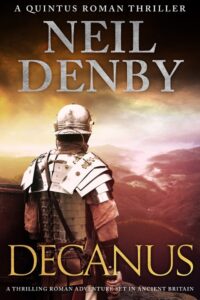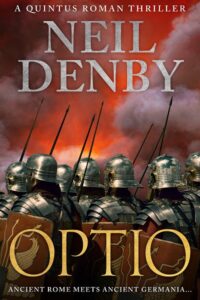Neil Denby is the author of the Quintus Roman Thrillers series: action-packed, authentic historical military adventures set in Ancient Rome.
No doubt you are familiar with the major Roman gods: mighty Jupiter/Jove of the thunderbolts, king of the gods; Juno, his wife and the protector of the community; and their sons, Mars, god of war and lame Vulcan, god of the forge. Perhaps you also know that these were pretty much taken wholesale from the Greeks: Zeus does thunderbolts and lightning, and Hephaestus the blacksmith limps. However, unlike the Greek gods, who had their home on top of Mount Olympus, their Roman equivalents lived in forests, rivers and seas, at crossroads (compitalia) and boundaries and, if important enough, in temples.
The legionary soldier was as superstitious as the next Roman, perhaps even more so. Each had family gods, and needed not only to appease the gods, but to avoid offending them. The protagonist in my book series, Quintus, reveres Ceres, as goddess of agriculture. His comrade, Crassus, reveres Vulcan of the forge, while another comrade, Sextus, reveres Mercury, god of thieves and tricksters.
 It was a central part of legionaries’ duties to carry out the correct sacrifices, with the right animals, on the designated days. If this was not possible, a legionary or officer would become a priest himself — a simple matter of covering one’s head — and make the necessary requests and offerings. One of my characters, Tullius, will sacrifice anything to appease the gods (a seal, a mouse, a cockroach), whilst Sextus is adept at reading omens, auguries and stars, as seen in Legionary.
It was a central part of legionaries’ duties to carry out the correct sacrifices, with the right animals, on the designated days. If this was not possible, a legionary or officer would become a priest himself — a simple matter of covering one’s head — and make the necessary requests and offerings. One of my characters, Tullius, will sacrifice anything to appease the gods (a seal, a mouse, a cockroach), whilst Sextus is adept at reading omens, auguries and stars, as seen in Legionary.
The gods were invoked for good fortune, honoured with sacrifices and remembered on particular occasions. The oddest thing about Roman gods was the number of them that started their life as humans. When it came to turning actual people into divine beings, the Romans did not hold back. Romulus, founder of Rome, had a temple, and the shepherd’s hut in which he and his brother had lived still stood in Rome 700 years after his death. Julius Caesar claimed descent, via Aeneas, from Venus.
With Caesar’s death came what is referred to as the ‘imperial cult’. After his assassination and on the orders of the victors of Actium, he became a god — Divus Julius — gaining temples, priests and sacrifices. The newly minted Augustus (previously Octavian) became divi filius — son of a god — one of the titles he most loved. Other emperors followed, including both Augustus and his wife.
The legionaries in my stories refer to Julius Caesar as the general, the dictator or Divine Julius, depending on how well they knew him. He was assassinated in 44BC, less than thirty years before the beginning of the first book, Legionary. This is within living memory for many of my characters; indeed, the veteran Marcus served under Caesar as a young man.
There were countless gods that fell in and out of fashion, including all the souls of the departed. Larés and manés were the minor gods that represented the benevolent souls of the dead, whilst the lemurés were reckoned to be malevolent.
Religion thus permeated every aspect of a soldier’s life. They were all gods-fearing, if not gods-bothering — though they may have actually met some of those who were deified!

